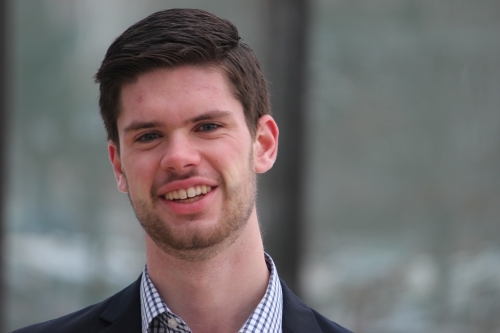College of Nursing senior Patrick Smith selected as Fulbright scholar
Public health interest leads to study of Community Understanding and Perceptions of Lesotho’s National Health Reform

The Kingdom of Lesotho (“the Mountain kingdom”) - a constitutional monarchy - is a landlocked country of 2.2 million people surrounded entirely by South Africa. With mountainous, rural communities, its economy is based on agriculture, mining, manufacturing, and subsistence farming. The life expectancy averages 49 years and about 40% of the population lives below the international poverty line of $1.25 a day.
It is Lesotho where senior Patrick Smith, newly selected as a Fulbright scholar, will study Community Understanding and Perceptions of Lesotho’s National Health Reformafter receiving his BSN
The people of Lesotho face substantial geographic, social, and economic barriers to attaining comprehensive health care services. According to Patrick, recent interventions instituted by Partners in Health (PIH) have led Lesotho’s Ministry of Health and Social Welfare (MoHSW) to undertake a national health reform that will increase accessibility and quality of care in rural communities through investment in regional health centers. “While prior research and clinical data certainly justify this investment, no researcher has investigated and described public perception of these reforms,” he says.
Patrick further explains that, “As a nursing student and undergraduate researcher, I have directly observed how uptake of available health services depends upon community understanding and awareness. By using qualitative research processes to assess community members’ perceptions of the reform, I aim to provide useful programmatic feedback; to further global understanding of the human experience of patients living in mountainous Lesotho; and to draw attention to global health practices that are measurably transforming health outcomes for populations in last-mile communities.”
During his time on campus, Patrick’s interests in international development, global health equity, and social justice flourished and were nourished through his participation and leadership in such groups as Nursing without Borders, Hunger and Homelessness Awareness Week Committee, and Catholic Relief Services Ambassadors. His work as a CDC Public Health Scholar, where he observed and contributed to community health research, is actively improving care for low-income, functionally-challenged older adults; and his past endeavors as a Global Impact Fellow serving with Unite For Sight in Ghana have supported healthcare delivery in resource-limited settings.
Patrick’s shift from campus to the wider world has been building for four years. Asked about the relationship between his undergraduate nursing education and his current interests, he notes that his experience with direct patient care has heightened his sensitivity to patients’ holistic needs and strengthened his awareness of the many factors – biologic, social, and environmental, among others – that can influence their health. As he begins to transition from care of patients to the care of populations, Patrick explains that he “aims to practically support access to urgently needed health services while advancing my research acumen, cultural humility, and knowledge of global health care delivery.”
Patrick’s experiences have led to this opportunity, yet the learning continues. “As a Fulbright scholar, I will continue to develop critical perspectives and skills that will enable me to advocate for nurses’ involvement in public health; promote patient-centered care through data-driven policy recommendations; and lend unique perspective to dynamic, diverse, and developing field of global health equity,” he says.
As he gets closer to boarding a flight leading him to Lesotho, Patrick assumes the responsibility of serving as “an influential ambassador for the nursing profession and the United States.” He has a laser focus on the future and says his professional - and deeply personal - journey starts with this first step: “By engaging in ambassadorship and community-based health research as a Fulbright scholar, I intend to develop skills that will enable me to pursue a doctoral dissertation on locally-driven health systems innovation within Sub-Saharan Africa. In this manner, I intend to develop as a rising professional capable of contributing to the creation of effective, socially just, and community-led health systems through the United States Agency for International Development.”
